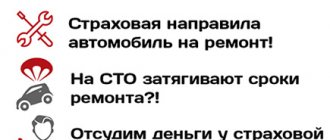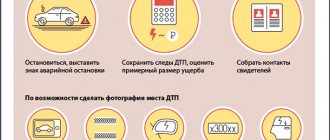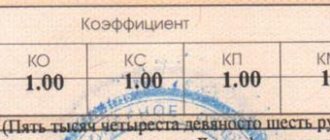Auto insurance has become an integral part of the life of any vehicle owner. But, unfortunately, more and more insurance companies are deliberately deceiving their clients by not paying them compensation for an insured event, or by making partial payments. We should talk further about what to do if you do not agree with the insurance payment under MTPL.
What to do if you don’t agree with the payment under OSAGO
In relations with an insurance company, it often happens that, having gone through the entire lengthy procedure of processing an insurance payment, the client waits until his damage is finally covered, but in the end he discovers with surprise and indignation that the amount paid is much less than expected. Similar situations happen everywhere and are not surprising. It’s unfortunate, but insurers are often ready to do anything just to deceive their clients and not pay them extra. You need to figure out what to do if you don’t agree with the payment under compulsory motor liability insurance.
First of all, you need to pay special attention to several key points. As a rule, the fact of underpayment is revealed when the victim in an accident discovers that he does not have enough money to carry out all the repair work, or the amount of compensation does not correspond to the examination data. If you are faced with a similar problem, then you need to understand how much you were underpaid. To do this, you need to contact the insurance company and request a copy of the assessment report on the basis of which payments were made. In most cases, insurers try to find any excuse not to show documents to the client. But there is a small nuance here: if there is an MTPL insurance policy, the client has the right to familiarize himself with the documentation, and the refusal of the insurers is an offense.
In any case, it will be much easier to contact an independent expert and conduct an additional assessment of the damage received by the car as a result of an accident. This will help you verify that the insurance company has underpaid you and will give you the opportunity to understand the extent of the underpayment. Immediately after you have the expert conclusions in your hands, you need to find a qualified lawyer and turn to him for help. Automotive lawyers will help you recover the entire missing amount of money from insurers, and thereby protect you.
Important! Remember not to rush too much. Initially, the insurance company must assess the damage to your car. And only then will this right pass to the owner of the car. If the examination is carried out before the insurers, it may be declared invalid, and its results will not be taken into account in the trial.
As practice shows, if there is disagreement regarding the amount of loss, insurers always voluntarily refuse to pay the full amount of compensation. Therefore, this cannot be done without the participation of the courts. If the amount of underpayment is up to 20 thousand rubles, then going to court may not be justified. Your costs may significantly exceed the amount of the underpayment. Just conducting an independent examination will cost at least 5-10 thousand rubles, and there are also various court costs, state fees and lawyer fees.
But if the amount of underpayment exceeds the mark of 20 thousand rubles, then in this case a trip to court is necessary. Often, insurers take advantage of this moment and do not pay their clients insignificant amounts in order to discourage the latter from going to court.
Let's imagine a situation in which the client does not agree with the payment under compulsory motor liability insurance. What to do if the property was purchased on credit or lease? The main condition for issuing a bank loan is insurance of property, as well as the life and health of the lender. In the case of purchasing a car in installments, you will need to take out a CASCO policy. As practice shows, even despite the presence of insurance policies, insurers often try to deceive their clients. It is worth examining several situations that occur most often in practice.
- The buyer purchased the car in installments and took out a CASCO insurance policy for it. Everything was going great, the client repaid his debt on time, but one not very good day his car got into an accident and could not be repaired, or the car was simply stolen. And in such a situation, the insurance company will have to pay off the entire debt of its client. But what most often happens is that insurers repay only that part of the loan that has not yet been paid to the bank, completely excluding from the calculations those amounts of money that have already been paid by the client.
- When participating in a loan program, the lender is required to insure the collateral. There is a small nuance in this situation. It is necessary to take out insurance not for the entire loan period, but only for a year. Otherwise, you may encounter a problem when the insurance company deducts the amount of the insurance premium from the compensation for the duration of the policy, and the remaining compensation may not be enough to pay the loan, not to mention anything else.
When insuring collateral, the main beneficiary becomes the bank that issued the loan. Therefore, in order to defend your interests in the event of unforeseen situations, you need to look for a lawyer who specializes in resolving such issues and has significant experience in dealing with insurance disputes.
The insurance company underestimated payments in case of total loss of the car
You can often encounter situations of this nature. Your car received serious damage as a result of an accident, and the insurance company considered that the car was no longer repairable, that is, there was a complete loss of the insured property. It is immediately worth noting that there is no unified system for assessing damage in such a situation, and different companies use different calculation mechanisms. Some consider a vehicle that has received 70% damage to be beyond repair, but for some companies this figure is 80%.
If you agree with the insurance company’s conclusion that the car is no longer usable, then you have the right to refuse the usable remains of the car in favor of insurance compensation, and in return you will receive a full insurance payment excluding depreciation, if it is provided for in the agreement. If you decide to keep the remains of the car for yourself, then in this case you will be faced with the fact that insurers will significantly inflate the cost of usable remains, and your insurance compensation will be significantly reduced. Naturally, in such a situation, the car owner does not agree with the payment under compulsory motor liability insurance, and will prefer to act through the court with the help of a qualified lawyer.
There is another situation. Upon careful study of the case, you understand that the damage received does not allow insurers to recognize the car as beyond repair. Often, the insurance company deliberately delays the inspection data until it recognizes the total loss of the car, and this is quite understandable, because repairing the vehicle can cost a huge amount. At the same time, in order to reduce the cost of payments, insurers additionally lower the price of suitable balances, and as a result, the amount of compensation is small. It is quite natural that in such a situation the owner of the vehicle does not agree with the amount of payment under compulsory motor liability insurance. And in order to resolve this conflict, he needs to enlist the support of a qualified lawyer and go to court.
Important! Remember that the decision to keep the usable remains of the car is made solely by the owner of the vehicle. Therefore, despite the arguments of the insurers, the choice has to be made by you.
How to challenge a payment under compulsory motor liability insurance
In order to receive the funds that the insurance company was obliged to pay you, you will most likely have to conduct an additional independent examination. This is most often required in cases where you have previously carried out an assessment based on a referral from an insurance company. It often happens that these two structures cooperate with each other, as a result the client may not receive his legal funds.
The next decision of the examination must refute the previous conclusion. As a rule, when going to court, bailiffs will give preference to the second examination. However, remember that it is not recommended to repair your car until you receive the full amount due.
As a rule, insurance companies significantly underestimate the volume of insurance payments, not wanting to incur additional damage. How to challenge payments under compulsory motor liability insurance? Needs to be analyzed in detail.
So, you were not satisfied with the amount, and you carried out a second expert assessment and received a conclusion in your hands. What's next?
- It is necessary to competently draw up a claim in which you explain in detail your disagreement with the compensation provided. It should be noted that this claim is pre-trial, and in the absence of a positive answer, you will resolve this issue through the court. Don’t forget to make a photocopy of the paper for yourself before sending this document to the insurance company’s address. If the case goes to court, this document will be useful to you. Also keep all receipts you receive in the mail. All dates for sending and receiving registered letters must be indicated there.
Important! When conducting a second independent assessment, be sure to notify the person responsible for the accident. Therefore, he will be invited to this examination. The same certified notice should be sent to the insurance company. If this is not done, the examination may be considered unreliable and will have to be carried out again, spending considerable money.A copy of the repeated independent opinion must be attached to the completed claim. If you are sending this document in person rather than by mail, be sure to have it officially registered. Get a document confirming this, or make a copy of the claim and request that it be certified with a wet seal indicating the date the document was received. The state provides another 30 days to consider the pre-trial claim. If during this period the insurers did not give a positive answer, or did not answer anything at all, you can move on to the next step.
- File a lawsuit on your own or with the help of an experienced lawyer. It is better to contact a lawyer for help. There are a lot of pitfalls in dealing with insurance companies, and without being well acquainted with the laws and intricacies of this matter, it will not be easy to win. Sometimes the court does not immediately recognize the second examination as valid. A third, forensic examination may be ordered. If, based on its results, you turn out to be right, then all legal costs, including independent examinations, will fall on the defendant.
Most often, legal costs can also be compensated by a court decision. However, you should not ask for too large sums, as the court may find your demand unreasonably high and you will not receive anything.
How does an insurance company underestimate the amount of payments under compulsory motor liability insurance?
Legislative regulations that regulate insurance disputes provide for both maximum amounts of compensation and those that are calculated taking into account the wear and tear of vehicle parts. However, this does not in any way prevent insurance companies from creating conditions under which they have the opportunity to significantly reduce the total amount of insurance compensation. This often happens like this:
- Insurers send the car for evaluation by an expert who is interested in the outcome of the case, and therefore gives incorrect information, thereby underestimating the amount needed to restore the car to operability. Initially, everything goes according to plan. Insurers agree to pay and send the car for inspection. It's only then that things start to get weird. First they pay you the amount, and then it turns out that it is not enough for repairs. In response to your complaints, they tell you that the amount was calculated taking into account the wear of parts, and recommend that you pay attention to cheaper analogues of spare parts;
- The insurance company claims that some of the damage is not related to this accident, and was received as a result of other collisions. The appraiser provides a real report on the condition of the car. But you are faced with the fact that insurers are beginning to assure that the damage was not caused by an accident. There is also a situation in which money for the repair of a certain part is not awarded due to the fact that it allegedly has older damage. Of course, the owner of the car does not agree with the amount of payment under MTPL, but the insurance company exercises its right to reimburse the undisputed part of the insurance compensation (Article 63 of the MTPL Rules).
If the owner of the car does not agree with the payment under compulsory motor liability insurance, then he will initially have to carry out his own independent examination of the car. At the same time, it is necessary to do it even if you have already started repairing your car. However, in order not to initiate additional conflict situations with insurers, it is still recommended to carry out an examination before the start of repair and restoration work.
Delay in payment under compulsory motor liability insurance. Find out what to do when making corrections to the European protocol here.
You can find a sample of filling out the European protocol at the following link:
By law, an employee of the insurance company must be present at the expert assessment. Well, or at least, insurers should be notified of the date and place of the examination. This must be done in writing. Verbal notification will not be sufficient. The most ideal option is to send a registered letter with acknowledgment of receipt. Or, alternatively, you can personally give notice to the insurers. It just needs to be drawn up in two copies, and each of them must have the date of acceptance, your signature, and the seal of the insurance company along with the signature of an authorized person. One of the copies of the notification must be kept by the victim in the accident. When initiating legal proceedings, this paper will be needed as evidence that the insurers knew about the expert assessment at your insistence.
What to do if the insurance company has underestimated the payment under compulsory motor liability insurance?
If you are faced with the fact that the insurance company has underestimated your insurance compensation, then there is only one way to solve this problem - through legal proceedings. However, this must be done only after you have evidentiary documents in your hands, in particular the original and a copy of the independent expert’s assessment, a copy of the insurance act, data on the notification of insurers about the examination and payment documents for all necessary work.
Often, the insurance company cuts payments not in isolated cases, but en masse, hoping that many car owners simply will not argue and get involved in a legal conflict. Therefore, in addition to filing a claim in court, it is also necessary to write a complaint to the Russian Union of Auto Insurers and the Federal Financial Markets Service. If you doubt the success of the upcoming lawsuit, then only a qualified and experienced car lawyer can help you restore peace of mind. He will help you get to the truth and will do everything possible to hold the insurance company accountable while protecting your interests.
To understand the problem, you first need to determine what is considered an understatement of the amount of insurance payments. Based on current legislative standards, the amount of insurance compensation is 120 thousand rubles (for contracts concluded before October 1, 2014) and 400 thousand rubles for all agreements executed after this period. In this case, the amount of insurance compensation may take into account wear and tear of parts and the marketable condition of the vehicle.
Independent experts cooperating with insurers are independent in name only. They often have an interest in the results of the inspection, and therefore, without hesitation, they underestimate the cost of damage, do not take into account small details and exclude some repair work. All this together adds up to a significant amount. Statistics show that often the amount of underpayment can range from 50 to 90% of the total insured amount.
Remember that a reduction in payments under compulsory motor liability insurance is grounds for a lawsuit. And if you do not agree with the amount that the insurance company has charged you, do not waste time, but try to find a good auto lawyer who can protect your interests and hold insurers accountable.
What to do if you do not agree with the financial ombudsman's decision.
After the financial ombudsman has reviewed your appeal, you have the right to go to court if:
- do not agree with the decision of the financial ombudsman that has entered into force;
- the financial ombudsman refused to consider your appeal or did not make a decision within the period established by law;
- consideration of the appeal was terminated on the grounds established by Article 27 of Federal Law No. 123-FZ of June 4, 2018.
If you disagree with the decision of the financial ombudsman that has entered into force, you have the right, within 30 days after the date of entry into force of the said decision, to go to court and file claims against the financial organization on the subject contained in the appeal, in the manner established by the civil procedural legislation of the Russian Federation.
A copy of the application to the court must be sent to the financial ombudsman.











